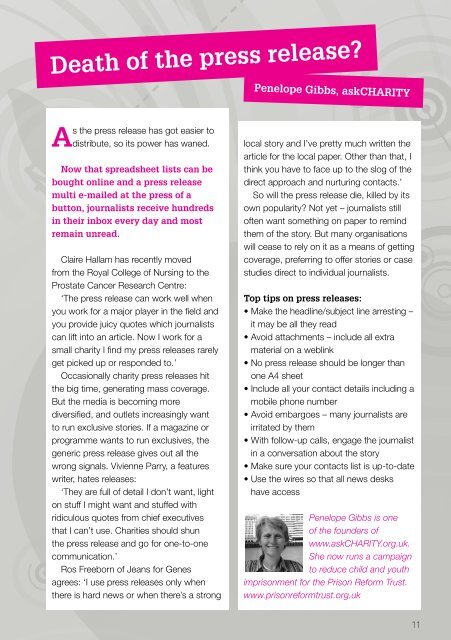Clever Communications - Voluntary Action Media Unit
Clever Communications - Voluntary Action Media Unit
Clever Communications - Voluntary Action Media Unit
Create successful ePaper yourself
Turn your PDF publications into a flip-book with our unique Google optimized e-Paper software.
Death of the press release?<br />
As the press release has got easier to<br />
distribute, so its power has waned.<br />
Now that spreadsheet lists can be<br />
bought online and a press release<br />
multi e-mailed at the press of a<br />
button, journalists receive hundreds<br />
in their inbox every day and most<br />
remain unread.<br />
Claire Hallam has recently moved<br />
from the Royal College of Nursing to the<br />
Prostate Cancer Research Centre:<br />
‘The press release can work well when<br />
you work for a major player in the field and<br />
you provide juicy quotes which journalists<br />
can lift into an article. Now I work for a<br />
small charity I find my press releases rarely<br />
get picked up or responded to.’<br />
Occasionally charity press releases hit<br />
the big time, generating mass coverage.<br />
But the media is becoming more<br />
diversified, and outlets increasingly want<br />
to run exclusive stories. If a magazine or<br />
programme wants to run exclusives, the<br />
generic press release gives out all the<br />
wrong signals. Vivienne Parry, a features<br />
writer, hates releases:<br />
‘They are full of detail I don’t want, light<br />
on stuff I might want and stuffed with<br />
ridiculous quotes from chief executives<br />
that I can’t use. Charities should shun<br />
the press release and go for one-to-one<br />
communication.’<br />
Ros Freeborn of Jeans for Genes<br />
agrees: ‘I use press releases only when<br />
there is hard news or when there’s a strong<br />
Penelope Gibbs, askCHARITY<br />
local story and I’ve pretty much written the<br />
article for the local paper. Other than that, I<br />
think you have to face up to the slog of the<br />
direct approach and nurturing contacts.’<br />
So will the press release die, killed by its<br />
own popularity? Not yet – journalists still<br />
often want something on paper to remind<br />
them of the story. But many organisations<br />
will cease to rely on it as a means of getting<br />
coverage, preferring to offer stories or case<br />
studies direct to individual journalists.<br />
Top tips on press releases:<br />
• Make the headline/subject line arresting –<br />
it may be all they read<br />
• Avoid attachments – include all extra<br />
material on a weblink<br />
• No press release should be longer than<br />
one A4 sheet<br />
• Include all your contact details including a<br />
mobile phone number<br />
• Avoid embargoes – many journalists are<br />
irritated by them<br />
• With follow-up calls, engage the journalist<br />
in a conversation about the story<br />
• Make sure your contacts list is up-to-date<br />
• Use the wires so that all news desks<br />
have access<br />
Penelope Gibbs is one<br />
of the founders of<br />
www.askCHARITY.org.uk.<br />
She now runs a campaign<br />
to reduce child and youth<br />
imprisonment for the Prison Reform Trust.<br />
www.prisonreformtrust.org.uk<br />
11


